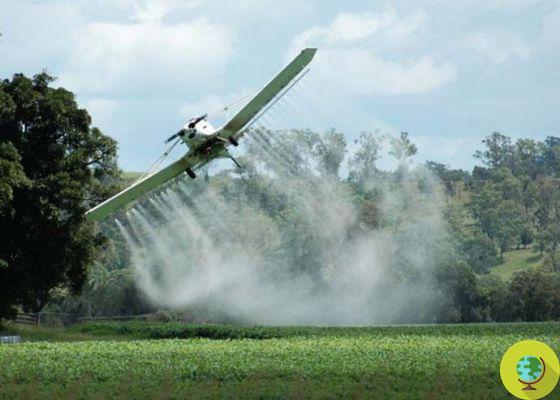An investigation launched in Santa Caterina (Brazil) revealed that the deaths of 50 million bees in January were caused by pesticide poisoning. The main culprit turned out to be fipronil.
He is about to end up run over, his mother saves himAn investigation launched in Santa Caterina (Brazil) revealed that the deaths of 50 million bees in January were caused by pesticide poisoning. The main culprit turned out to be fipronil.
We have already talked about it, the situation of bees in Brazil is truly dramatic. It is a real massacre that, throughout the country, has led to the death of 500 million insects!
In Santa Caterina (state which is the largest exporter of honey in Brazil with 99% of the certified organic production), 50 million dead bees. Tests conducted in this regard have shown that the main fault is fipronil, an insecticide used in soybean crops.
It was in January that, during the inspection in their apiaries, the producers in the area realized what was happening and it was already too late. Fibronil (banned in countries like Vietnam, Uruguay and South Africa as it is lethal to bees) and other pesticides had already done terrible damage.
Tests on samples of dead bees, collected by the Cidasc State Government Agency (Companhia Integrada de Desenvolvimento Agrícola de Santa Catarina) in the two most affected cities, Major Vieira and Rio Negrinho, were analyzed by a laboratory in Piracicaba in the state of São Paulo. .
These have noted in particular the presence of three pesticides: the fungicide trifloxystrobin, the insecticide triflumuron (both produced by Bayer) and, to a greater extent, the insecticide fipronil, introduced in the country by BASF.
Both companies claim that their products, if used correctly, are safe for the environment and Cidasc basically agreed with them as they did not hold any manufacturer responsible for the slaughter of bees, believing that the contamination was accidental.
The three aforementioned pesticides are actually classified as "Highly toxic" but Brazil still authorizes its use in crops.
“Brazil is the opposite of the rest of the world. Substances that cause deaths in animals and people remain on the market. Not to mention that 290 new pesticides were released this year alone from January to August. 40% of these poisons are banned in other countries, ”said Greicia Malheiros, president of the Forum for the fight against pesticides and GMOs, made up of 80 public and private institutions.
What is Fipronil
It is a insecticide derived from nicotine which is often sprayed by single-engine aircraft over crops and applied directly to the soil before sowing and to seeds.
Generally the product is spread on crops during the soybean flowering period, when there is no ban but there is a recommendation for producers to use common sense and not poison the flowers, as they will then be visited by pollinating insects.
The soybean flower isn't a favorite of bees, actually, but due to deforestation and monocultures, these insects have fewer and fewer options and therefore adapt.
Going back to fipronil, this was regulated in Brazil in 1994 and is very problematic and dangerous for bees as it causes neuronal hyper-excitation, producing electrical discharges that lead to insect paralysis and cell death.
In addition to damage to bees, among other things, these poisons can be linked to the decline of butterflies, birds, aquatic insects and possibly bats.
Given the evidence of the damage caused by fipronil, the state government is internally negotiating two proposals that should be included in the management plan by the end of the year. The first is that of limit the use of fipronil to seeds, which could make Santa Catarina the first state in Brazil to restrict its use. The second measure instead provides for activating the geolocation relating to the use of fipronil in crops, so that it is always available in the state database. If the plantation is located near the hives, an alert will be sent to the Cidasc technicians to monitor the bees.
The governor of Santa Catarina then surprised everyone going against President Jair Bolsonaro (which we remember being the one who granted the use of most of these pesticides) by creating an interim measure for the staggered taxation of pesticides.
The measure will take effect in January next year. Highly and extremely toxic products will be taxed at 17% while moderately toxic products will have a tax burden of 12%.
La Green Taxation, as it was christened, is unprecedented in the country and aims to encourage cleaner agriculture in Santa Catarina.
Will this save the Brazilian bees?
On the subject read also:
- Massacre of bees in Brazil: 500 million dead insects in three months. Blame the pesticides granted by Bolsonaro
- Bolsonaro shock: green light for 152 new pesticides (LIST)
- Massacre of bees in Veneto: 10 deaths due to pesticides
- Massacre of bees in Friuli: it is the fault of pesticides, corn fields seized
- Insect apocalypse in the US caused by a 50-fold increase in toxic pesticides
- France saves bees and bans all 5 pesticides responsible for their death
Sul fipronil you might also be interested in:
- Fipronil: The toxic insecticide also affects generations that have never been exposed
- Contaminated eggs: in Europe after Fipronil there is an alarm for another antibiotic
- Pesticides: Bayer and Sygenta's appeal rejected. The ban remains, but fipronil will be free again
- Fipronil: what it is, how it got into eggs and what health consequences



























